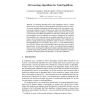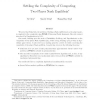206 search results - page 13 / 42 » Computing Equilibria in Anonymous Games |
MP
2006
13 years 6 months ago
2006
We present a distribution-free model of incomplete-information games, both with and without private information, in which the players use a robust optimization approach to contend ...
CORR
2007
Springer
13 years 6 months ago
2007
Springer
— Separable games are a structured subclass of continuous games whose payoffs take a sum-of-products form; the zero-sum case has been studied in earlier work. Included in this su...
SAGT
2010
Springer
13 years 5 months ago
2010
Springer
Can learning algorithms find a Nash equilibrium? This is a natural question for several reasons. Learning algorithms resemble the behavior of players in many naturally arising gam...
TAMC
2010
Springer
13 years 11 months ago
2010
Springer
An instance of the max k−cut game is an edge weighted graph. Every
CORR
2007
Springer
13 years 6 months ago
2007
Springer
We prove that Bimatrix, the problem of finding a Nash equilibrium in a two-player game, is complete for the complexity class PPAD (Polynomial Parity Argument, Directed version)


